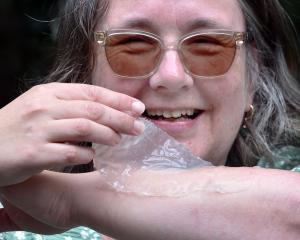Living on the bank's overdraft was never part of the plan when Rob and Bridget Berry entered the dairy industry.
Instead, they saw it as a lifestyle change and the opportunity to build something for their two children.
They embraced the farming lifestyle and are now in their second season sharemilking just over 600 cows near Momona, on the Taieri Plain. But life is far from easy.
• OCR cut urged to ease dairy woes
In simple terms, the latest cut, announced yesterday, to Fonterra's milk price forecast - from $4.15 to $3.90 - meant they were "going backwards''.
"You don't get into an industry like this and work your guts out to do that. That's pretty much what it is for us,'' Mr Berry (38) said.
Brought up in South Auckland and a fitter and turner by trade, Mr Berry and his wife, who comes from an early childhood background, moved to Otago about 12 years ago.
After leaving his job at Farra Engineering, he did four seasons working for wages on a dairy farm before moving into lower-order sharemilking.
The change in career was something of a "childhood dream'' for Mr Berry, while Mrs Berry (39) added it was a "now or never kind of thing''.
"Just an opportunity popped up and we grabbed it,'' he said.
Asked whether he regretted the move, Mr Berry said it was "not so much regrets [but] I certainly question what the hell I'm doing every day at the moment''.
"It's hard on sharemilkers; we haven't really got any equity to fall back on.
"We're basically relying on the bank. How long they'll keep propping us up, I don't know.''
While the couple acknowledged they had good support from their bank, they also had to be realistic: that support was not going to last forever.
"If we pull out, we'll be back at square one. Forty years old and starting off at square one again is pretty horrible,'' he said.
Mrs Berry said what kept the couple on the farm was a positive attitude - "trying to be positive'', her husband interrupted with a laugh - and a passion for what they did, as they acknowledged many others were in the same situation.
"We love where we live, we love what we do, we love our animals, we love the lifestyle we give our children, but there are aspects of it, I guess, we weren't expecting.
"There's definitely a lot to be grateful for. We're very grateful for where we are at in life. We're not afraid of a challenge; we certainly don't baulk at the idea of a challenge. It's the financial sustainability that will be the clincher for us,'' she said.
While they had no plans to leave, because of that passion and "utter determination'', another tough season and they might not be able to carry on, they said.
The couple, who were grateful for the support of their "fantastic'' farm owner, were doing everything they could to keep their costs down.
"Doing frugal'', as Mrs Berry put it, was something they were used to.
Children Eva (9) and Oscar (7) were developing
a greater understanding of "why they can't do this and why they can't have that''.
By doing 16-hour milkings, they were running the shed with one less milking every two days and they were also running a lean operation staff-wise.
All dairy farmers were taking note of what they were spending and that had a flow-on effect, including affecting those in the cities, Mrs Berry said.
Federated Farmers and DairyNZ will this week start a series of six regional meetings for sharemilkers and their farm owners.
Sharemilkers, particularly those who did not own their herd, were the most vulnerable in the current market conditions, Federated Farmers dairy chairman Andrew Hoggard said.












